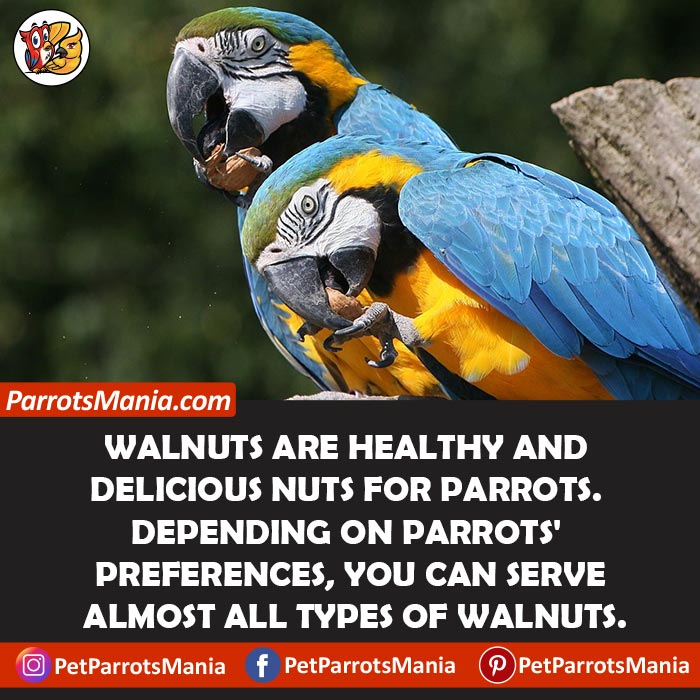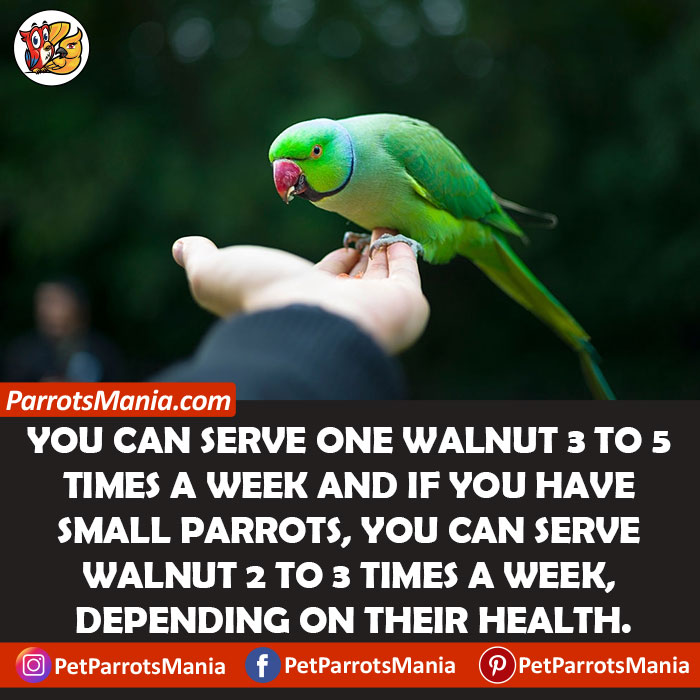Last Updated on October 28, 2022
Parrots usually like to eat crunchy nuts, and you can feed nuts to them anytime. I love to serve walnuts to my parrots, and they enjoy it. I want to tell you some interesting facts about it, so let’s discuss can Parrots Eat Walnuts. Are they healthy for parrots? How much quantity of walnuts can parrots eat? Let’s learn some basic and important information about walnuts for parrots.
Walnuts are healthy and delicious for parrots. Depending on the parrots’ preferences, you can serve almost all types of walnuts. They will provide various nutritional values to parrots. Taking care of walnut quantity while serving parrots is important because excessive serving can cause health issues.
However, some more important things to know while serving walnuts to parrots, such as what types of walnuts are and whether they are healthy for parrots. How to serve walnuts? Chop or unchopped? Raw, cooked, or boiled? So, read the article until the end for the right information.
Can Baby Parrots Eat Walnuts?
Yes, walnuts are safe for baby parrots, and you can feed them unshelled and chopped to avoid choking. Baby parrots are unable to break the hard shells of walnuts.
Next, this article will discuss complete details about how to feed walnuts to parrots and their kinds and nutritional benefits.
Walnuts For Parrots:
Walnuts are considered healthier than almonds and peanuts. Many people like to eat walnuts, but most are unaware of their nutritional value, so they usually don’t serve walnuts to their parrots. However, according to research, walnuts can provide great health benefits to little feathery pets.

So, if you serve a small number of walnuts to parrots as a snack, it will benefit them. It is an excellent source of omega-3 fatty acids, vitamins, minerals, and fiber. Walnuts are also enriched with antioxidants. So walnuts are a great source of all the nutrients parrots need for their daily activities and proper health.
Many kinds of walnuts are present, but three are the most important and are easily available. So, to get more information about healthy walnuts, let’s start with the next section.
What Type Of Walnuts Are Healthy For Parrots?
Walnuts are healthy and safe for parrot feeding. So, according to their types, I will share three main categories of walnuts. All are edible and easily available, but you can serve any of them depending on availability.
Can Parrots Eat English Walnuts?
English walnuts, also known as Persian walnut, are among their most popular and common varieties. Parrots love to eat them. They are tasteless, and you can roast them for parrots.
English walnuts are enriched with various nutritional values, so a moderate serving benefits the parrot’s overall health. They are widely cultivated.
Can Parrots Eat Black Walnuts?
They are less common than English walnuts. Most parrots in the wild eat black walnuts. They have thicker or hardshell around them. These walnuts have a blander flavor and a strong aroma and are flavorsome.
After removing the hard shell, you can serve a few Black walnuts to parrots, as some may hurt themselves while cracking walnuts on their own.
Can Parrot Eat White Walnuts?
White walnuts are a species that is sweeter than other walnuts. They, also known as butternuts, are oily nuts with mild flavors. Many parrots love to eat sweet white walnuts.
White walnuts are expensive, so if you have some, you can serve 1 or 2 to your parrots. Serve White walnuts in moderation. Excessive consumption can harm your parrots due to their high sugar and oil content.
Can Parrots eat Chopped and Unchopped walnuts?
You can serve both chopped and unchopped walnuts. If you have big parrots, it’s better to serve them unchopped, as the parrots can easily deshell walnuts due to their strong jaws. If you have small parrots, it is best to serve without shells so they may not choke on them.

Depending on the parrot’s health and mood, you can also chop walnuts for big parrots, as in some cases, parrots don’t prefer to deshell the nuts on their own. So, consider their preferences before serving them walnuts so your serving method may not disturb the parrot’s mood.
Can Parrots Eat Soaked Walnuts?
Parrots can eat soaked walnuts. Walnuts are hard nuts, so they become soft and easier to digest after soaking. They are bitter, but their bitterness is reduced after soaking in water. That’s why many pet owners prefer to feed soaked walnuts to their parrots so they may not feel that much bitterness. You can dry them after soaking.
Keeping soaked walnuts in an airtight jar or container would be best. Remember to dry them with a clean cloth to avoid fungus.
Can Parrots Eat Roasted Walnuts?
Parrots can eat roasted walnuts, but if you roast them without additional ingredients, such as oil, salt, etc. Parrots always enjoy the crunch, so they love to eat roasted walnuts more than plain walnuts. Make sure to serve roasted walnuts in small portions so they may not harm your parrot’s health.
You can roast them on the stove for 5 to 10 minutes, depending on the quantity. You can also toast them in the oven.
How Often Can I Serve Walnuts to Parrots?
The number of walnuts you can serve to the parrots always depends on your parrot’s species, age, and health. If you have a large parrot species, you can serve one walnut to your parrots daily, along with other meals.
Serving the number of walnuts also depends on your parrot’s diet cycle. You can serve a walnut 3 to 5 times a week if they eat everything properly. It is sufficient for them, but if you have small parrots, you can serve walnut 2 to 3 times a week, depending on their health.
Why Should You Serve Walnuts as Treats?
You may think that if walnuts are super healthy and enriched with various nutrients, why should you always serve them as treats? Parrots in the wild eat more than domestic parrots because their activities are greater than domestic parrots. They fly for miles to get their food, as they need to find their food independently.

However, pet parrots are provided with all kinds of food by their pet owners, so they are picky eaters and have less activity in captivity as of the wild. So usually, they eat more than their required nutritional values.
That’s why you should always serve them nutritious food appropriately to avoid excessive feeding and its harmful effects. Also, it is best to engage your pet parrots in some activities to digest their food easily.
Nutritional Benefits Of Walnuts To Parrots:
Walnuts are healthy nuts and are enriched with multiple nutrients, so a moderate serving of walnuts can provide various health benefits to your parrots, such as:
- Walnuts improve heart health.
- They prevent cancerous diseases.
- Walnuts are also beneficial for skin and feathers.
- It controls diabetes.
- It improves the bone health of parrots.
- Walnuts help reduce inflammation.
- Walnuts are a natural mood booster.
- It improves the parrot’s metabolism.
- They are enriched with antioxidants.
- Walnuts are beneficial for a healthy brain and memory.
- They reduce bad cholesterol levels.
- They lower blood pressure.
- Walnuts are also helpful for a healthy digestive system.
- A moderate portion of walnuts can prevent constipation.
- Walnuts also support gut health.
- They are also helpful in boosting the parrot’s immunity.
Side Effects Of Walnuts on Parrots:
Walnuts are healthy and don’t cause any health issues, but serving them in excess consumption can lead to severe health issues such as:
- It can disturb parrots’ digestive systems.
- It may cause choking.
- Excessive consumption may lead to obesity issues.
- The fiber in the walnuts may cause gastrointestinal issues if you serve them in excess amounts.
- It can cause allergic reactions, such as nausea, vomiting, stomachache, nut allergy, bloating, etc.
Hence, remember to serve only in a moderate serving to avoid these adverse issues.
Conclusion:
Parrots can eat walnuts, and a moderate intake can provide several health benefits. I have shared complete details about walnuts for parrots, so I hope you will like this article and that it will be helpful for you. If you intend to serve walnuts to parrots, follow all the information to prevent any side effects. You are more than welcome if you want to add anything or ask any questions. I will be there to answer all your queries.

